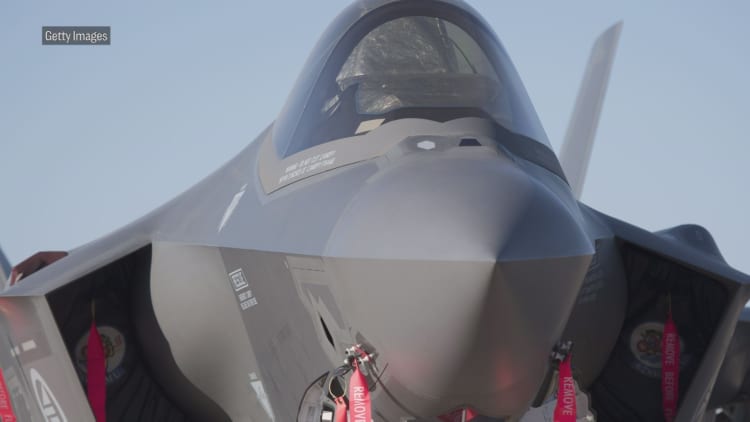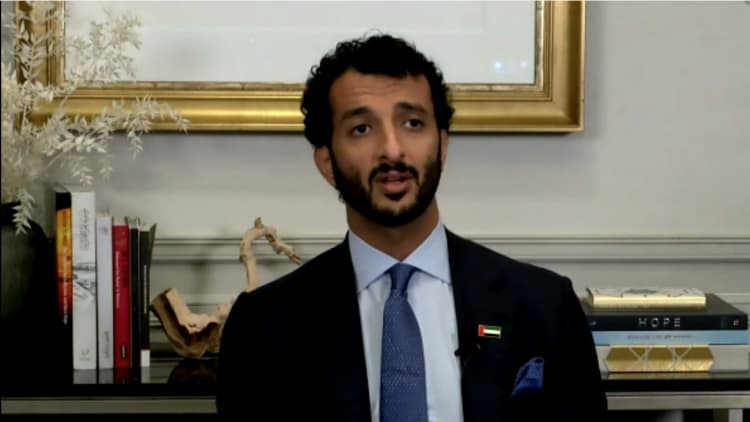DUBAI, United Arab Emirates — President Donald Trump's administration has notified Congress of its intent to sell 50 Lockheed Martin F-35 II joint strike fighter jets to the United Arab Emirates, in a sale that could amount to $10 billion.
The news Thursday came less than two months after the signing of the Abraham Accord, an agreement establishing diplomatic relations between Israel and the UAE, which has opened up a wealth of opportunities in trade, technology and security cooperation.
The UAE has for years had its eye on the F-35, the most advanced fighter jet platform on the market. But the main hurdle was Israel, which is legally guaranteed a qualitative military edge (QME) by the U.S. that ensures a technological advantage over its neighbors and exclusive access to some of America's best arms.
So it was major news when Israel's defense minister last week said the country would not oppose Washington selling "certain weapons systems" to the Emiratis — widely interpreted as a green light for the F-35, which Israel already owns.

Unfathomable just a few weeks ago, the development speaks volumes about Israeli-UAE relations and the rapidly fortifying alliances against Iran that will define the Middle East for decades to come. If approved, the sale would make the UAE only the second country in the region to get the fifth-generation system.
"It really is a nail in the coffin of the old Middle East," Michael Rubin, a former Pentagon official and resident scholar at the American Enterprise Institute, told CNBC. "That the Israelis have no objection suggests that the agreement between Israel and the UAE isn't just based on mutual interest, but also on trust. The potential sale of the F-35 to the UAE signals just how seriously the Emiratis take the Iranian threat."
Still, there is no deal done yet. Congressional and bureaucratic approvals, as well as security concerns — like ensuring that no highly classified information about the platform's capabilities or missions can be accessed by hostile powers — remain key hurdles.
Not just a jet; a 'game changer'
The F-35 is not just a jet, experts stress. It is the Pentagon's most expensive procurement program to date and is thought to be more advanced than anything else on the market. It can identify and eliminate threats before it is detected thanks to its stealth technology, supersonic flight speeds and highly classified passive tracking capabilities.
"The thing that makes it really a real game changer is the combination of that stealth with the ability to gather huge amounts of information through its sensor suite without giving itself away," Justin Bronk, a combat airpower and technology specialist at the Royal United Services Institute in London, told CNBC.
The jets currently go for $100 million apiece. "The F-35 is qualitatively heads above what Iran possesses," Rubin said. "It gives the Emiratis the ability to retaliate against Iran for any malign activities."
Will Congress approve?
The Trump administration is reportedly working on ways to uphold Israel's QME as part of the plan, which will likely involve sales of other weapons and technologies.
But congressional approvals, as well as passing U.S. export control regulations, "should not be assumed as automatic," said Charles Forrester, principal analyst for MENA industry at IHS Janes.
In response to the Trump administration's move, House Foreign Affairs Committee Chairman Eliot Engel expressed "concern," saying in a statement Thursday that "rushing these sales is not in anyone's interest."
Congress has been hostile to Gulf weapons exports in recent years. Trump's declaration of a national emergency in 2019 to bypass Congress and sign a more than $8 billion weapons sale to the UAE, Saudi Arabia and Jordan drew angry bipartisan criticism.
A potential new U.S. administration could also cause delays. On Wednesday, Tony Blinken, foreign policy advisor to Democratic nominee Joe Biden, expressed "concerns about what commitments may or may not have been made to the UAE with regard to the F-35."
Still, the AIE's Rubin contends, "the Emiratis aren't toxic in Congress the way Saudi Arabia is." But some analysts warn that if the Emiratis get the jets, the Saudis will demand to follow suit.
'A serious security risk concern'
Exporting the F-35 to the Gulf could be "another potential way for Chinese and Russian in particular, but also potentially Iranian, intelligence operations to gather sensitive information about the jet," said Bronk.
Defense espionage is common, and while China and Russia don't have military bases in the UAE, there is a substantial level of engagement between the countries. The UAE operates Chinese Wing Loong lethal drones, among other equipment, has bought Russian arms including mobile air defense systems and in 2018 signed a strategic partnership agreement with Moscow.
Certain weapons systems as well as foreign technicians operating on UAE military bases could pose an espionage threat, said RUSI's Bronk. "Chinese technicians do regularly work for and with the UAE air force ... so it is a serious security risk concern for the U.S.," he said.

Aware of the concern, Forrester said the UAE has been "working hard to improve its security and intellectual property controls," launching a trade control office and working with Lockheed Martin and Raytheon, who have regional headquarters in the country.
Even with all the necessary approvals from Congress, U.S. weapons sales move slowly. From signature of sale to jet on the tarmac generally takes at least five years, Bronk said.
But the rapidly forming alliances in the Middle East and continued heavy spending by Gulf countries — as well as increased selling by U.S. rivals like China and Russia — are quickly reshaping the region's dynamics. Gulf ambitions are growing, and "at the same time, as the Iranians pivot toward China," Rubin said, "it defines the Persian Gulf as the new front line in great power rivalry."
Correction: On Wednesday, Tony Blinken, foreign policy advisor to Democratic nominee Joe Biden, expressed "concerns about what commitments may or may not have been made to the UAE with regard to the F-35." An earlier version misstated the day.


